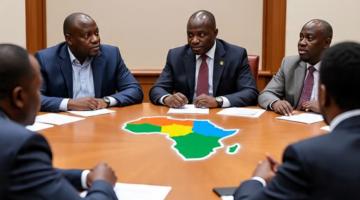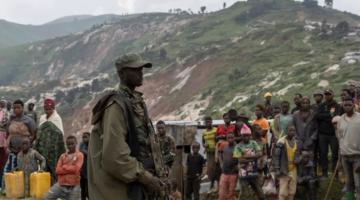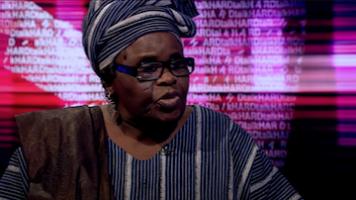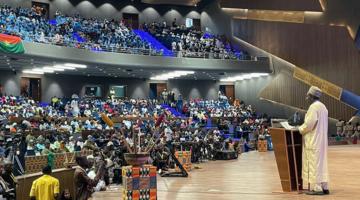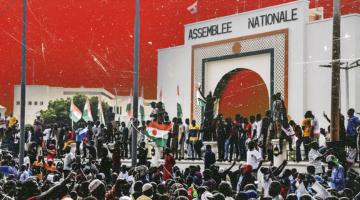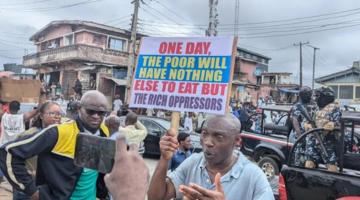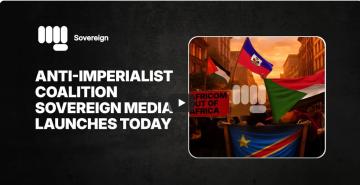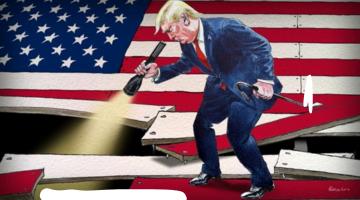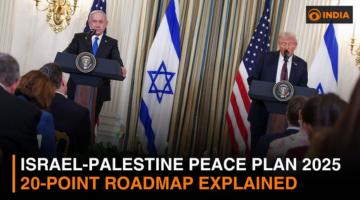More than sixty years ago, Nkrumah told us why it was important that Africa unite. Today, his message and roadmap for Pan-African unity is needed more than ever.
For some, the idea of Pan-Africanism is a caricature or cliche: at best, it is an unthinking and aesthetized celebratory account of the cultural connections between Black folk worldwide; at worst is the inevitable and existential failure of African unity, the invariably and cynical end game of the so-called “diaspora wars.” Of course, both versions are not only wrong, but mistaken in their focus. For, as Kwame Nkrumah brilliantly reminds us, Pan-Africanism is a practical and necessary relationship among Africans and, in particular, recently decolonized African nations. Nkrumah’s Pan-Africanism is primarily a political economy of African union that can ward off those vultures, the ex-colonial powers, and bolster African sovereignty and independence.
In an essay titled “Why Africa Must Unite,” published almost sixty years ago in the premier issue of the journal Africa and the World, Nkrumah not only outlined his vision for a union of African states, but enumerated the reasons that such a union was necessary to promote African development. The basis of his argument was a critique of neocolonialism - the attempts by the US and Europe to control the resources and wealth of nominally independent African states. For Nkrumah, there was both strength in numbers and power in geography. A united front of African states could prevent balkanization and re-colonization, repel the NATO assault on Africa, and control the wealth and riches of the continent. At the same time, the self-contained nature of the continent created a logical basis for a shared communications, transportation, monetary, and industrial infrastructure. While desiring to promote cooperation among African states in areas such as mining and agriculture, Nkrumah also saw the importance of “common action” in defense, foreign policy, and economic development — including a common currency for Africa that would break dependence on the dominant Sterling and franc zones.
It’s often said — dating back to Marcus Garvey’s vision of a United States of Africa — that such Pan-African unions are impossible. But if the recent actions in Niger, Mali, Burkina Faso and elsewhere are a sign of things to come, neocolonialism may finally die so that Nkrumah’s dream of Pan-Africa may live. Indeed, as Nkrumah told us:
It is not one empire which is expiring, but the whole system of imperialism which is at bay. It is not individual communities, but the whole of humanity which is demanding a different and better way of life for the world’s growing millions.
Greater revolutions have created mighty nations and empires, and the waves of those revolutions lap the shores of Africa no less than they do those of other continents.
We reprint “Africa Must Unite” below.
Why Africa Must Unite
Kwame Nkrumah
Osagyefo Dr. Kwame Nkrumah, President of Ghana, is the foremost advocate of African unity. He was a leading participant in the 5th Pan-African Congress in Manchester in 1945. Ever since he has fought for this great creative project – in speeches, articles, books, and by organizing international conferences. Here, once again, Nkrumah sets out the fundamental arguments for a Union Government of Africa and warns of the dangers which will result from further delay. - Editor.
The decisions which are now made in Africa will not only influence the lives of the two hundred and eighty million inhabitants of our continent today; they will influence the course of events for countless generations of Africans yet unborn.
A monumental decision was taken when the Organization of African Unity was founded.
Yet, despite the measure of unity which has been achieved, the historical conditions in which African independence has emerged and the concrete manifestations of our weakness and difficulties, call for immense radical and urgent measures which the Addis Ababa Conference did not fulfill.
It is not single states or single continents which are undergoing decolonization, but the greater portion of the world. It is not one empire which is expiring, but the whole system of imperialism which is at bay.
It is not individual communities, but the whole of humanity which is demanding a different and better way of life for the world’s growing millions.
Greater revolutions have created mighty nations and empires, and the waves of those revolutions lap the shores of Africa no less than they do those of other continents.
Great technological and industrial revolutions have transformed the economies of large portions of the world.
A revolution in communications brings knowledge of every change in the world to the remotest corners of our continent. The world will not wait – nor will it move step by step, however much we may wish this.
It is against a background of great political, social, cultural, scientific and technological revolutions that the emergence of African independence and the development of Africa must be viewed.
Time is the crucial factor, for time acts for those who use it with purpose, and not for those who let it slip by. Those who do not use time as their agent, give the advantage to those who do.
When the O.A.U. was founded last year, the world was at the beginning of an era of peaceful co-existence.
The risk of a World War was abating and the prospect of peaceful cooperation between the Great Powers appears to bring to an end the struggle of foreign influences in Africa.
We embraced non-alignment in order to escape involving ourselves in the prevailing cold war politics.
New Upsurge
Instead, however, we have witnessed a menacing upsurge of imperialism and a revival of colonialism itself in Africa, and foreign interference and subversion in the internal affairs of our African states.
The one essential factor which united us at Addis Ababa – the overriding factor which made all differences and difficulties seem trivial and irrelevant – was the need to free that part of our continent which is still in the grip of imperialism.
Yet in spite of our Charter, in spite of our resolutions, in spite of our common front at the United Nations and in other international gatherings what have we witnessed?
Far from deterring the imperialists and neocolonialists from giving support to the apartheid regime in South Africa and to the fascist regime in Portugal, the NATO Powers have poured and are pouring vast sums of money and vast armaments into the apartheid regime of South Africa and Portugal.
Not only is South Africa being assisted to grow stronger economically and militarily, but the cruelty, repression and exploitation of our African brothers have reached new heights.
By raising a threat at Addis Ababa and not being able to take effective action against apartheid and colonialism, we have worsened the plight of our kinsmen in Angola, Mozambique, Southern Rhodesia and South Africa.
We have frightened the imperialists sufficiently to strengthen their defenses and repression in Southern Africa, but we have not frightened them enough to abandon apartheid supremacy to its ill-fated doom.
Task Harder
It must be said that by merely making resolutions on African Unity, and not achieving our goal of a Union Government of Africa, we have made our task of freeing the rest of the AFrican continent harder and no easier.
The North Atlantic Treaty Organization powers have not deterred one white from sending all the arms needed by the Salazaar regime to keep down our kinsmen in its colonies.
The Portuguese fascist regime has not made a single move has not made a single move to negotiate with the United Nations or with the nationalist forces.
It has become more insolent, more mendacious and more repressive since the Conference in Addis Ababa.
What has gone wrong?
The imperialists regard our Charter of Unity as token unity; they will not respect it until it assumes the form of a Union Government.
It is incredible that they will defy a united Continent. But it is easy to understand that they do not believe that we will be able to accomplish the next stage–to organize and centralize our economic and military and political forces to wage a real struggle against apartheid. Portuguese fascism and those who support these evils with trade, investment and arms.
We have not yet made the imperialists believe that we can set our continent in order as a mighty economic force, capable of standing together as a united and progressive people.
Serious border disputes have broken out and disturbed our continent since the O.A.U. was formed. Fortunately, good sense and African solidarity have prevailed in all those instances. But the disputes have been smothered, not settled.
The artificial divisions of African States are too numerous and irrational for real permanent and harmonious settlements to be reached, except within the framework of a Continental Union.
How, for example, can we prevent the people of Western Somalia, whose livelihood is in cattle-grazing from continuing to look for fresh fields for grazing by traveling beyond traditional barriers without bringing them into clashes with their compatriots in Ethiopia?
And yet, in a united Africa, Ethiopian land and Somalian [sic] land, even though they may be separately sovereign within the framework of a Union Government of Africa, will belong to a common pool which would assist the general development of cattle-rearing in that part of our continent, because threw would be no artificial barriers to such development. The benefit of the development will be for the benefit of both Ethiopian and Somalia.
A real danger is that border disputes will grow with the economic development and national strengthening of the African States as separate balkanized governmental units.
That was the historical process of independent states in other continents. We cannot expect Africa, with its legacy of artificial borders, to follow any other course, unless we make a positive effort to arrest that danger now; and we can do so only under a Union Government.
History’s Warning
History has shown that where the Great Powers cannot colonize they balkanise. This is what they did to the Austro-Hungarian Empire and this is what they have done and are doing in Africa.
If we allow ourselves to be balkanized, we shall be re-colonized and be picked off one after the other.
NOW is the time for Africa’s political and economic unification.
By far the greatest wrong which the departing colonialists inflicted on us, and which we now continue to inflict on ourselves, was to leave us divided into economically unavailable States which bear no possibility of real development.
As long as the chief consideration of the industrial nations was our raw materials at their prices, this policy made sense for them, if not for us.
Now that their technological impetus is such that they need Africa even more as a market for their manufactured goods than as a source of raw materials, our economic backwardness no longer makes sense for them any more than for us.
They now need vaster and more prosperous markets for heavy agricultural tractors and electronic machines. They are concerned to sell to us, not merely day-by-day consumer goods or even things like motorcars, but the latest in supersonic jets and atomic-powered merchant vessels.
Re-Thinking
There is much rethinking on this score among the industrially-advanced countries, although their outlook is obscured because their economies are still geared to monopolistic devices for getting hold of our oil and gas deposits, uranium, gold, diamonds, and other raw materials cheap, and selling their manufactured goods back to us at exorbitant prices.
The poverty of the developing world has become a blot on the ethics and commonsense of the industrial nations.
The recent United Nations Conference on Trade and Development was not organized by accident or solely by pressure from the developing nations.
The growing economic gap between the two worlds spells misery for the developing countries but it also threatens the industrialized nations with unemployment and with dangerous recessions and economic explosion.
We have reason to think that the imperialists themselves are in divided councils about the Unity of Africa. They must remain ambivalent, however, as long as they retain direct control over Southern Africa and neocolonialist control of the Congo.
But a Union Government of Africa would end the dilemma of the industrialized nations, because inevitably that wealth will be converted into capital for the development of Africa.
The fact that imperialism and neocolonialism are in that dilemma should be for us the clearest indication of the course we must follow. We must unite for economic viability, first of all, and then to recover our material wealth in Southern Africa, so that our vast resources and capacity for development will bring prosperity for us and additional benefits for the rest of the world.
That is why I have written elsewhere that the emancipation of Africa could be the emancipation of Man.
Is there any need to point out again that Africa is potentially the world’s richest continent, not only in mineral wealth, but also in hydro-electric power?
The wealth of the Sahara is as yet untapped; the waters and river of Tanganyika and Ethiopia are as yet unharnessed.
Capital Exists
All the capital we need for the development of these regions flows out of Africa today in gold, diamonds, copper, uranium and other minerals from Southern Africa, Northern Rhodesia, the Congo and other parts of the continent.
Every year in the Sahara and in other parts of Africa, new stores of mineral , chemical, and petroleum wealth are discovered.
All that is lacking in Africa is the will and courage to unite a divided but compact continent.
We in Africa are living in the most momentous era of our history. In a little less than one decade the majority of the territories in our continent have emerged from colonialism into sovereignty and independence.
In a few years from now, we can envisage that all Africa will be free from colonial rule. Nothing can stem our onward march to independence and freedom.
While we have cause to rejoice in this achievement, our central problem as Independent States is the fragmentation of our territories into little independent States and of our policies and programmes into a patchwork of conflicting objectives and uncoordinated development and plans.
While the post-war years have seen a phenomenal rise in the prices of manufactured goods which we need to sustain progress and development in our States, the prices of the raw material which we export have shown an alarmingly steady decline.
So the disparity between the “haves” or the highly developed nations and the “have-notes” or developing nations, becomes inevitably wider and wider as our needs grow greater and greater.
How can we resolve this tragic paradox, except by uniting our forces and working together in Africa as a team?
Disputes
Yet, during the period between the two O.A.U. conferences of Heads of State, we experienced clashes between Algeria and Morocco, between Somalia and Ethiopia and between Somalia and Kenya; we experienced military upheavals and mutinies in Tanganyika, Uganda and Kenya; and we experienced confusion, frustration and tragedy in the Congo.
Because of our inability to bring our brothers in the Congo the assistance they needed, there were internal disagreements and discord, endless maneuvering for positions among the political leaders, the tragedy of fratricidal strife, and, on the other hand, foreign intervention and pressure, intrigues, and coercion, subversion and cajolery.
In all this confusion, the power of imperialism has a fertile ground. It even dares us to use openly certain African States to promote its selfish plans for the exploitation and degradation of the Congo.
We are unable to hold back foreign intrigues, because we are divided among ourselves. None of us is free and none of us can be safe, while there is frustration and instability in any part of this continent.
There is this political and military instability. Our economic weakness and subservience is self-evident.
Same Pattern
All over Africa the existential economic pattern developed under colonialism remains. Not one of us, despite our political independence, has yet succeeded in breaking in any substantial measure, our economic subservience to economic systems external to Africa.
It is the purpose of neocolonialism to maintain this economic relationship.
In many cases our most valuable raw materials – such as minerals – are owned and exploited by foreign companies. Larger parts of the wealth of Africa, which could be used for the economic development of Africa, are drained out of the continent in this way to bolster the economies of the developed nations.
The whole world is poised at a delicate economic balance and economic collapse in any one part of the world would have great repercussions on us.
Our citation in Africa is so weak that we are bound to be the first and the worst sufferers if economic difficulties should set in in Europe or America, and the effect upon us would be absolute and catastrophic.
We have nothing to fall back on. We have become so utterly dependent upon those outside economic systems that we have no means of resistance in external economic fluctuations. We have no economic resilience whatsoever within our own continent.
We are so cut off from one another that in many cases the road system in each of our countries peters out into bush as they approach the frontier of our neighborhood.
How can we trade amongst ourselves when we do not even have proper means of physical communications? It is not possible to travel by air from Accra to London in six hours. I can fly from Accra to Nairobi or from Accra to Cairo in half a day.
It is easy for us to get together to talk. But on the ground over which we fly with such ease and nonchalance, it is frequently impossible to engage in the most elementary trade simply because there are no proper roads, and because we are artificially divided and balkanized.
Our few and negligible roads and railways lead, ultimately, to some port. In a sense they have become symbols of our economic subservience and our dependence on trade outside the African continent.
We have inherited from colonialism an economic pattern from which it is difficult to escape.
Great forces are arrayed to block our escape. When individually we try to find some economic independence, pressures are brought against us that are often irresistible owing to our disunity.
I am not arguing that we should cut off all economic relationships with countries outside Africa. I am not saying that we should spurn foreign trade and reject foreign investment.
What I am saying is that we should get together, think together and organize our African economy as a unity, and negotiate our general continental economic planning. Only in this way can we negotiate economic arrangements on terms fair to ourselves.
Unity Now
The Organization of African Unity was a declaration of intention to unite. It was an optimistic beginning. But we need more than this. We must unite NOW under a Union Government if this intention is to have any meaning and relevance.
To say that a Union Government for Africa is premature is to sacrifice Africa on the altar of neo-colonialism.
When we went to Geneva to seek fair play and justice in international trade, there were no less than seventy-five of us in one group set against a few of the great industrialized countries of Europe and the United States.
Yet how weak was our bargaining power because of our political and economic disunity and divisions!
How much more effective would our efforts have been if we had spoken with the one voice of Africa’s millions! With all our mineral and waterpower and fertile lands, is it not a cause for shame that we remain poor and content to plead for aid from the very people who have robbed us of our riches in the past?
I see no way out of our present predicament except through the force and power of a Union Government of Africa. By this I do not mean the abrogation of any sovereignty. I seek no regional unions as a basis for unity.
Indeed, the more independent states there are within our Union Government, the stronger will be our unity, and the freer will be each sovereign state within the Union to attend to its specific and exclusive problems.
Specific Fields
The specific fields of common action I have in mind are Defence, Foreign Policy and Economic Development (including a common currency for Africa).
In this way, instead of a Charter which operates on the basis of peripatetic or widely-separated commissions under the control of an administrative secretariat without political direction, we shall have a government for joint action in three fields of our governmental activity.
Let me refer again to the pattern of economic structure which we inherited from colonialism. Under colonial rule, we were encouraged to produce a limited number of primary commodities, mainly agriculture and mineral, for export overseas. Capital for development was owned by foreigners and profits were vigorously transferred abroad.
A trade pattern of this sort stagnated the rest of our national economy, and our resources remained undeveloped. In consequence, indigenous capital formation was negligible, leaving all our communities in a state of abject poverty.
Since independence, we have been demanding energetic efforts to reverse and overhaul these unsatisfactory features in our economy. In some of the Independent African States great efforts have been made to relax traditional economic links with the ex-colonial Powers, but none of us can say we have succeeded in breaking those dangerous links completely.
Another handicap which we suffered from colonialism was the restriction of our economies which has hampered economic development in many ways.
The very fact that all the Independent African states produce and maintain development plans is an indication of our deep concern for realizing nationalist aspirations and improving the conditions of living of our people.
But however deep our concern, however strong our determination, these development plans will avail us nothing if the necessary capital is not available.
This capital, as we all know, is everywhere desperately short. The men with the know-how are few and scattered. It is by coming together and pooling our resources that we can find a solution to this problem.
Unified Planning
In other words, only by unified economic planning on a continental basis with a central political direction within a Union Government can we hope to meet this economic challenge.
It takes millions of pounds to build the basic industries, irrigation and power plants which will enable us to escape from our present economic stagnation.
Our various individual, separate, balkanized States cannot mobilise the enormous amounts of money required for these major projects and industrial complexes.
We cannot bargain effectively for the essential funds from foreign sources on the best possible terms.
What we are doing now is to compete between ourselves for the little capital available from foreign sources.
In our scramble to get this capital we grant foreign firms extensive and lucrative concessions for the exploitation of our natural resources. These exacerbate the colonial patterns of our economy.
We invest more in raw materials than in industrial development, and the continued drain abroad of profits which should have been invented in economic development retards the progress of our industrial plans.
In a continental federal union, we could easily mobilise the amount of capital available to the African States by the establishment of a Central Monetary Development Finance Bank.
Already our various States have agreed to form an African Development Bank. This, however, cannot succeed without a continental economic plan and without the necessary political direction which only a Union GOvernment of Africa can provide.
An African Monetary Development Bank of the kind I envisage would enable us to formulate continental agreements concerning the terms of loans and investments by foreign interest.
Together, we could bargain more effectively with foreign firms and Governments for investments and loans for the kind of industries WE desire and not those THEY desire.
We could bargain on the terms of these loans and we could ensure that the increased sayings which would arise from continental development of Africa’s huge resources would enable us to develop even more rapidly.
Stop Competing
The unnecessary competition amongst us for capital would cease and moreover we could work up continental tariff policies designed to protect newly developed African industries.
The great risks involved in investing in our individual countries would be reduced, for in an African economic union our development projects would be backed by all the African states.
Another grave economic danger which drives us against one another is that (because our national development plans are not co-ordinated) as the general conditions of our economies are similar in all the Independent African States, this can only lead to a concomitant expansion of our separate productive capacities in excess of the quantity which can be profitably marked either internally or abroad.
The Danger
The certain result is that we shall establish cut-throat competition amongst ourselves with heavy financial losses to our respective economies.
The problem of African Unity must therefore be examined against the background of the economic position of the Independent African States, our aspirations for rapid development and the difficulties with which we are confronted in our separate existence.
If we examine these problems carefully, we cannot evade the conclusion that the movement towards African political unity will substantially and immediately contribute to the solution of the economic problems of the Independent African States.
Indeed, African Unity based on a continental Union Government is the only, I repeat only, possible framework within which the economic difficulties of Africa can be successfully and satisfactorily settled.
Indispensable
The appeal for a Union Government of Africa is therefore not being made merely to satisfy a political end. It is absolutely indispensable for our economic survival in the modern world.
We must remember that just as we had to obtain political independence from colonial rule as a necessary prerequisite for establishing new and progressive communities for our respective Stats, so we cannot achieve economic stability in Africa as a whole without the prerequisite of a continental Union Government.
Indeed, we cannot hope to sustain the economic development of Africa without first accepting the necessity for a continental division of labour to ensure that particular states specialized in their respective fields for which geographical, economic and social factors make them the most suitable, can develop to their fullest capacity with the best interest of the continent as a whole in mind.
Take, for example, the steel industry. This could be developed to the highest possible limit in Nigeria, Egypt or Mauretania, or Liberia or Ghana, to mention only a few instances. If we do not unite under a federal government, it is clear that each of the states mentioned will wish in their own national interests to pursue the possibility of establishing and expanding its own steel mill.
Indeed, this is already being done by some of us to the benefit, profit, and gain of foreign concerns.
If, however, our resources were combined to set up steel mills on a continental basis, at strategically chosen points in Africa, we would be in a position to make the greatest possible contribution to the industrial progress of the whole continent.
Without a conscious effort based on a common governmental programme, we cannot hope to achieve this end. We might even find ourselves using the resources of one area of Africa to retard the progress and development of one or more other areas by cut-throat competition.
The most casual glance at our continent should convince anyone that the price of our disunity is continued exploitation from abroad and foreign interference in our internal matters. No matter where we look in the continent, we will find that, to a greater or lesser degree, the same pattern of exploitation persists.
For example: the economy of the Congo (Leopoldville) is still dominated by three foreign groups which represent Belgian, French, British and American interests. Herein lies the Congo’s tragedy.
Two foreign firms–The Rhodesian Anglo-American Corporation and the Rhodesian Selection Trust –control the mining output of Zambia. Copper makes up eighty to ninety percent of Zambia’s exports, yet profits and interest shipped abroad annually often amount to as high as half of Zambia’s total export earnings!
Thus, despite political independence, nearly all of us are unable to exploit our agricultural and mineral resources in our own interests. Under a strong union government we would have the material resources for rapid industrialisation, whereby all of us — big or small–would be benefited.
But so long as we are divided, we will, to this extent, remain colonies in an economic sense. We shall remain puppets and agents of neo-colonialism.
Currency Problems
The truth of this is even more evident when we examine monetary zones and customs unions. Most African States are still in monetary zones linked to the former colonial power.
One-fourth of these States are in the sterling zone and one-half are in the franc zone.
Owing to this currency arrangement, trade between the Independent African States is restricted and hampered. Indeed, Trade is practically impossible within this financial environment.
As long as the States of Africa remain divided, as long as we are forced to compete for foreign capital and to accept economic ties to foreign powers because in our separate entities we are two small, weak and inviable to “go it alone,” we will be unable to break the economic patterns of exploitation established in the days of outright colonialism.
What steps are necessary to form a Union Government?
My proposals which I put forward at the July OAU conference in Cairo are based on the following:
The Union Government shall consist of an Assembly of Heads of States and Governments, headed by a President elected from among the Heads of States and Governments of the Independent African States.
The Executive of the Union Government will be a Cabinet or Council of Ministers with a Chancellor or Prime Minister as its head, and a Federal House consisting of two Chambers – a Senate and a House of Representatives.
Those states which agree to form the Union Government should immediately designate their Foreign Ministers to constitute a Working Committee to draft the Constitution for the Federal Union Government of Africa.
Report in Six Months
Within six months, the Heads of States and Governments should meet at a place to be agreed upon, to adopt and proclaim to the world the Federal Union Government of Africa.
It has been said that “great things from little causes spring.” How true this saying is can be judged from the beginning of some of the world’s Great Powers of today.
The United States started with thirteen weak economically nonviable colonies exposed to serious political and economic hardships. Yet today the United States of America is a world power with not less than fifty constituent states.
The Soviet Union, whose scientists have astounded the world with their interplanetary exploits, began their Union amid untold hardships and difficulties with but three states. Today the Soviet Union is composed of sixteen federated states.
We in Africa cannot wait, we dare to wait, until we are encompassed by our doom for failing to seize the grand opportunity, rising to the call of Africa’s finest hour.
This is the challenge which history has thrust upon us. This is the mandate we have received from our people that we set about to create a Union Government for Africa now and this is also the challenge which Providence and destiny has thrust upon us. We cannot, we must not, we dare not fail or falter.
Kwame Nkrumah, “Why Africa Must Unite,” Africa and the World, vol. 1, no 1, October 1963, p. 11-16.


